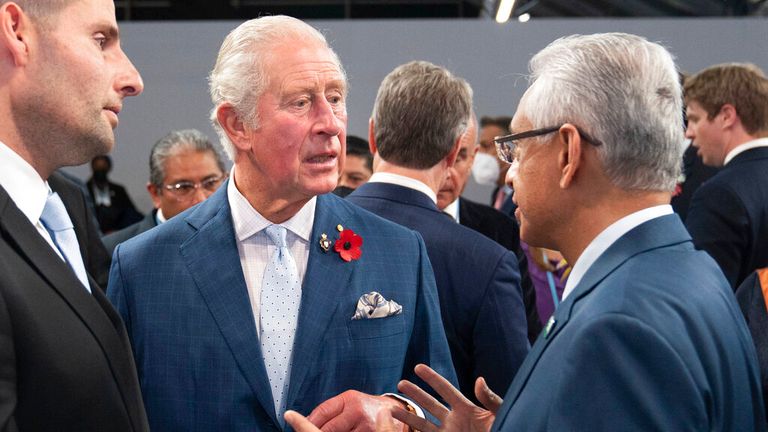Environmentalist King Charles faces a tough test if he wants to keep his personal climate fight alive
Long before it was deemed fashionable or important, King Charles was focused on the environment.

Long before it was deemed fashionable or important, King Charles was focused on the environment.
It is for this reason that he was deployed as a not-so-secret weapon ahead of the G20 and COP26 climate change summits in late 2021.
The Washington Post summed it up in its typically blunt American style: “Prince Charles, once dismissed as a plant-talking oddball, takes his environmental bona fides to COP26.”
Except this time it was not plants, but prime ministers.
There was hope his personal relationship with India’s Narendra Modi would help persuade one of the world’s largest polluters to agree to the phasing out of coal.
It almost did.
In the end, the Glasgow climate pact language urged countries to “phase down” rather than phase out unabated coal use.
Far from perfect, but better than nothing, and partly thanks to Charles.
Of course he is not elected, and cannot shape the laws or regulations of the UK.
And as monarch, he will be newly distanced from campaigning and convening, having already said in a speech: “‘It will no longer be possible to give so much of my time and energies to the charities and issues for which I cared so deeply, but I know this important work will go on in the trusted hands of others.”
By others, he means Prince William, whose Royal Foundation is already focused on protecting the natural world, and who also attended COP26.
It will be mainly via Prince William then, that the King will direct the extraordinary soft power of his family towards tackling climate change.
It is a power underpinned by a reach across the Commonwealth and its 2.4 billion people and it has been a long time in the making.
Read more:
‘She’s my mother and the Queen’: Elizabeth’s relationship with her four children
King Charles in pictures – life of royal as he becomes Britain’s monarch
Gun salutes, military bands and cheers as regional proclamations take place across UK
King Charles has been at this for fifty years.
Soil health, holistic medicine, organic food, sustainable, regenerative agriculture, radical town planning, rare-breed preservation, the importance of biodiversity and nature based solutions to climate change, the spiritual connection between people and the natural world – the list of his interests is long and has at times seemed wacky.
That is until the rest of the world started following suit.
Now billions are being poured into reforestation, decarbonising agriculture, reshaping the way we plan and build communities around mass transport, and much more besides.
An awkward problem
But it is not all roses and healthy bee populations.
Like most public figures who take a strong position on a particular issue, the King’s own life has and will be scrutinised for contradictions.
For example he may have converted some boilers to biomass, installed solar panels on the roof of Clarence House, and run his Aston Martin on bioethanol produced from white wine and whey.
But on the basis of his travel alone, offsets notwithstanding, King Charles’s personal carbon footprint is huge.
This brings us to an awkward problem.
Inequity and injustice are perhaps the central issues of climate change, and it is arguably much more challenging to be credible on these things when you are a royal.
Prince Harry learned this the hard way when he flew on a private jet to attend a Google-hosted climate change summit.
It may well be that the Royal Family sticks closely to the more familiar terrain of conservation.
But even this area is a fraught one for the monarchy of a former colonial power.
Conservation is a very comfortable conservative cause. The clue is in the name.
Former US president and environmentalist Theodore Roosevelt knew it, and so does the increasingly powerful Conservative Environment Network.
But an instinct to preserve the natural order of things can, if not articulated carefully, accompany other more politically perilous issues, like opposition to the population growth of developing countries.
Prince William once sailed very close to this particular wind, drawing criticism when he said in a speech that “the increasing pressure on Africa’s wildlife and wild spaces as a result of human population presents a huge challenge for conservationists, as it does the world over.”
Twitter justice was swift and vicious.
One conservative commentator wrote: “‘If the natives keep reproducing, there won’t be as many impalas for me to shoot!’ Morally backward as this line of thinking is, one cannot help but be amused by the audacity.”
Film and TV producer Franklin Leonard wrote: “‘There are too many Africans’ is quite the position.”
The incident is just one example of the scrutiny directed at the Royal Family.
But scrutiny is a fact of life for them.
Maximising an impact in the battle against climate change means choosing words and tone very carefully.
Not an easy task under the glare of a relentless spotlight, although it is unlikely to prevent them from trying.
